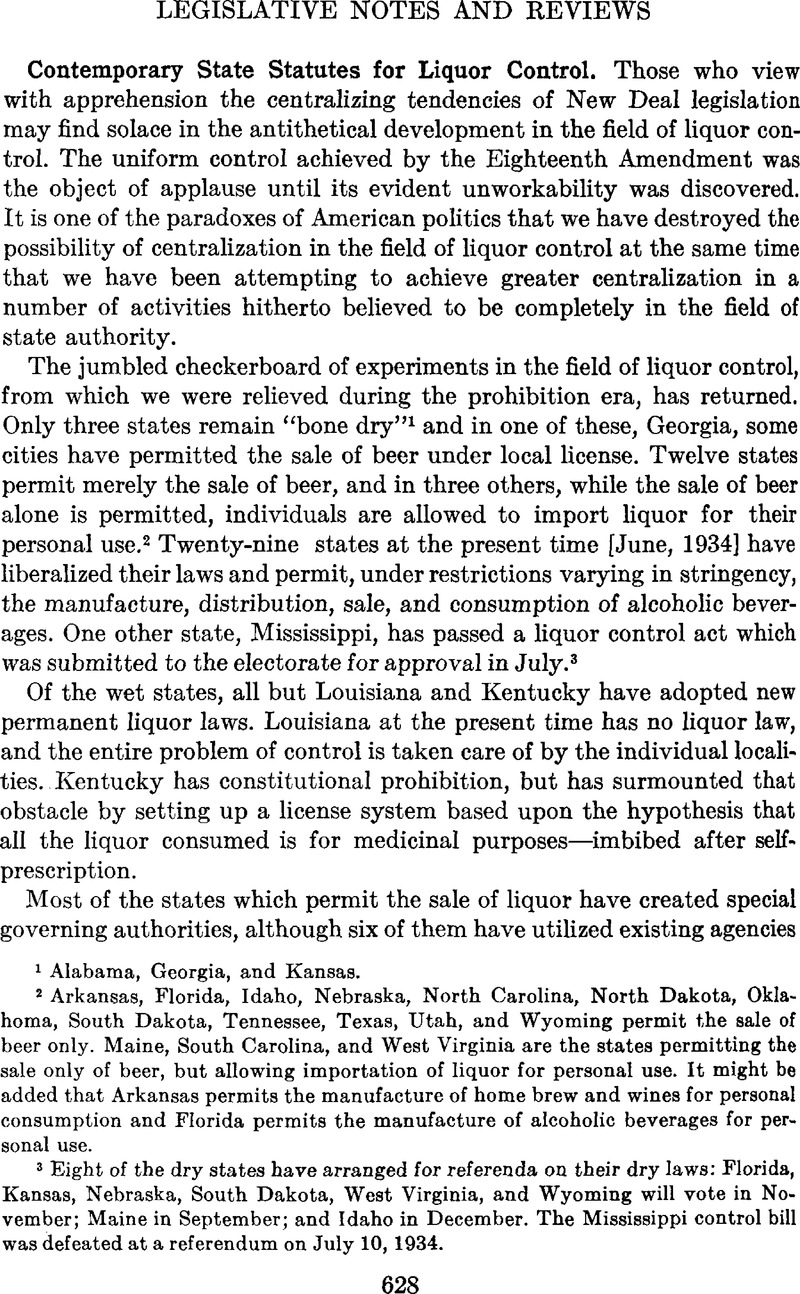Article contents
Contemporary State Statutes for Liquor Control
Published online by Cambridge University Press: 02 September 2013
Abstract

- Type
- Legislative Notes and Reviews
- Information
- Copyright
- Copyright © American Political Science Association 1934
References
1 Alabama, Georgia, and Kansas.
2 Arkansas, Florida, Idaho, Nebraska, North Carolina, North Dakota, Oklahoma, South Dakota, Tennessee, Texas, Utah, and Wyoming permit the sale of beer only. Maine, South Carolina, and West Virginia are the states permitting the sale only of beer, but allowing importation of liquor for personal use. It might be added that Arkansas permits the manufacture of home brew and wines for personal consumption and Florida permits the manufacture of alcoholic beverages for personal use.
3 Eight of the dry states have arranged for referenda on their dry laws: Florida, Kansas, Nebraska, South Dakota, West Virginia, and Wyoming will vote in November; Maine in September; and Idaho in December. The Mississippi control bill was defeated at a referendum on July 10, 1934.
4 Arizona, the state tax commission; California, the state board of equalization; Colorado, the state treasurer; Kentucky, the state tax commission; Maryland, the state comptroller; and Wisconsin, the state treasurer. All of these except Maryland and Wisconsin grant complete authority to the designated state agency.
5 In Montana, the state board of examiners, composed of the governor, the attorney-general, and the secretary of state, is made the state liquor control board with sole authority. The state board of liquor control in New Mexico is composed of the secretary of state, the attorney-general, and the director of public health. The liquor commission proposed in Mississippi is to be a body of three—the governor, the attorney-general, and the secretary of state. Only in Montana is this ex-officio body given exclusive authority.
6 Delaware, Indiana, Missouri, and New Jersey.
7 In Michigan, the board is composed of three appointive members with the governor and secretary of state acting as ex-officio members.
8 Connecticut, Illinois, Iowa, Massachusetts, Minnesota, New Hampshire, Oregon, Pennsylvania, Vermont, Virginia, and Washington.
9 Connecticut, Delaware, Illinois, Indiana, Oregon, Virginia, and Washington.
10 Delaware, Iowa, Michigan, Montana, New Hampshire, Ohio, Oregon, Pennsylvania, Vermont, Virginia, and Washington.
11 Local agencies assist the liquor control board in Vermont and Virginia.
12 Arizona, California, Colorado, Connecticut, Indiana, and Kentucky give exclusive authority to the state body, while Illinois, Maryland, Massachusetts, Minnesota, Missouri, New Mexico, New York, Rhode Island, and Wisconsin divide control between state and local agencies. In Louisiana and Nevada, complete administrative power is given to the local divisions.
13 In keeping with the intent of the monopoly plan to eliminate the profit motive, such distributors are usually paid a definite salary. Michigan, for example, provides that such distributors must be established merchants and must be paid an annual stipend not in excess of $1200. Iowa sets $900 as the maximum annual salary; while Ohio permits individual arrangements to be made, provided they involve a fixed salary.
14 Ohio is one of the states whose laws permit the commission to buy on consignment. (The F.A.C.A. prohibits the sale of liquor on consignment.)
15 The Massachusetts control board is authorized to fix the maximum retail price of beverages, while the Rhode Island commission is permitted to fix maximum wholesale prices.
16 The law provides that there shall not be more than one manufacturer for each 150,000 population, nor more than three in any one district; not more than 10 importers' permits per district shall be issued, and there shall be no more than one wholesaler for alcoholic malt beverages in each county of 20,000 or less.
17 The amount is determined upon the basis of the capacity of the distillery.
18 Iowa, Montana, New Mexico, Oregon, and Washington.
19 United States News, Vol. 2, no. 21 (May 29, 1934)Google Scholar.
20 Delaware grants licenses for “off-sales” to groceries, delicatessens, hotels, restaurants, and clubs.
21 Wisconsin provides that municipal stores may be set up, but none has as yet been established.
22 Arizona, Indiana, Missouri, and New Mexico. Indiana permits sale only by druggists, while Missouri insists that a licensee must have at least a $1500 stock of other merchandise to sell.
23 California prohibits sales in excess of fire gallons; Delaware establishes a maximum of one bottle of spirits or 12 bottles of beer or wine; Indiana sets the limit at six quarts; while Kentucky limits sales to not more than one quart of liquor or wine every seven days. Virginia prohibits sale of more than one gallon of spirits at a time, and Wisconsin has a similar limitation. The proposed Mississippi law prohibits sales in excess of 24 ounces every seven days. The Oregon control authority is permitted to establish maximum purchases, but has not exercised the prerogative.
24 Alcoholic Control Act, Section 7(a).
- 1
- Cited by



Comments
No Comments have been published for this article.